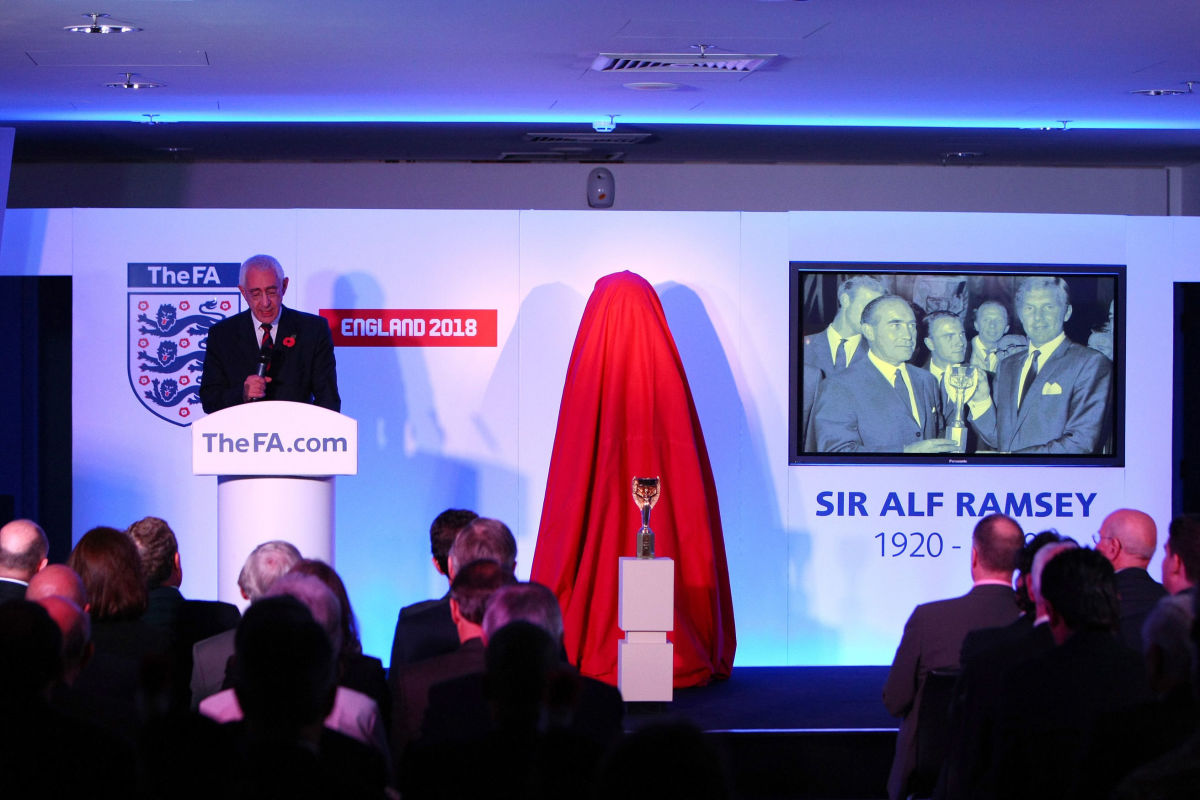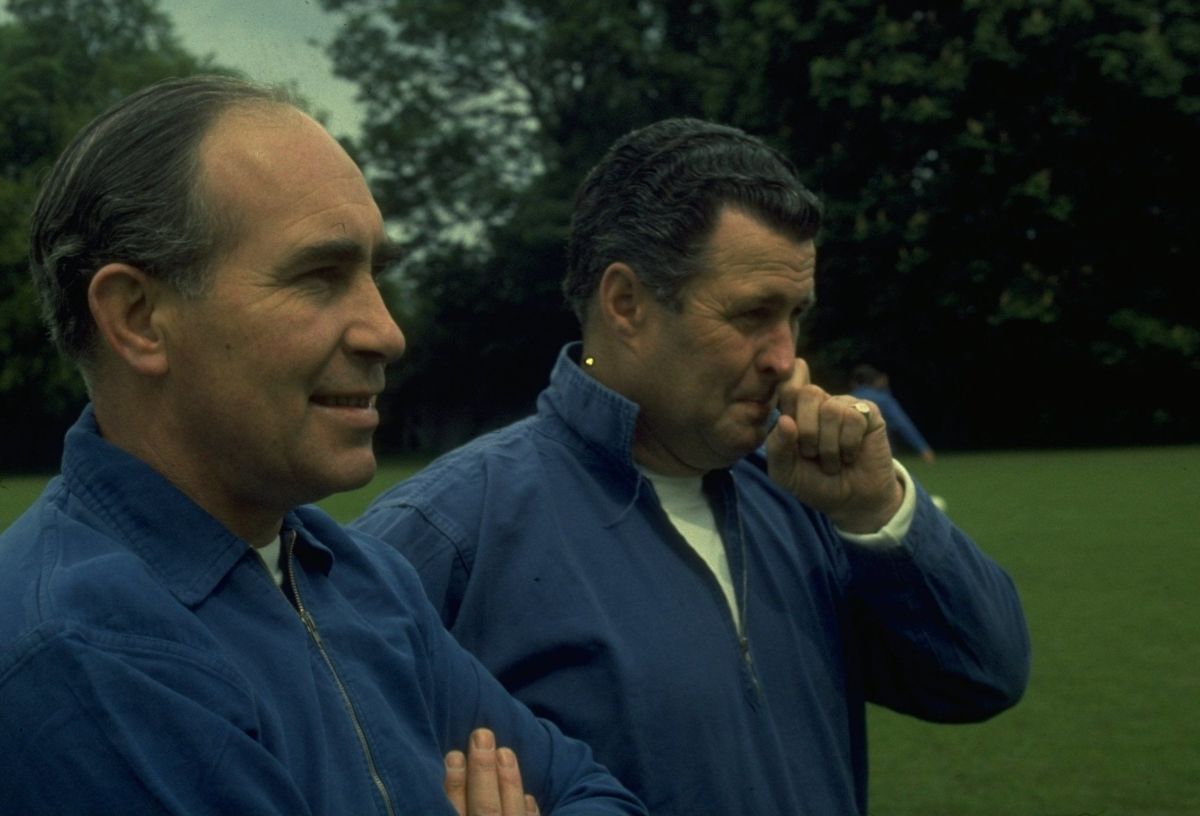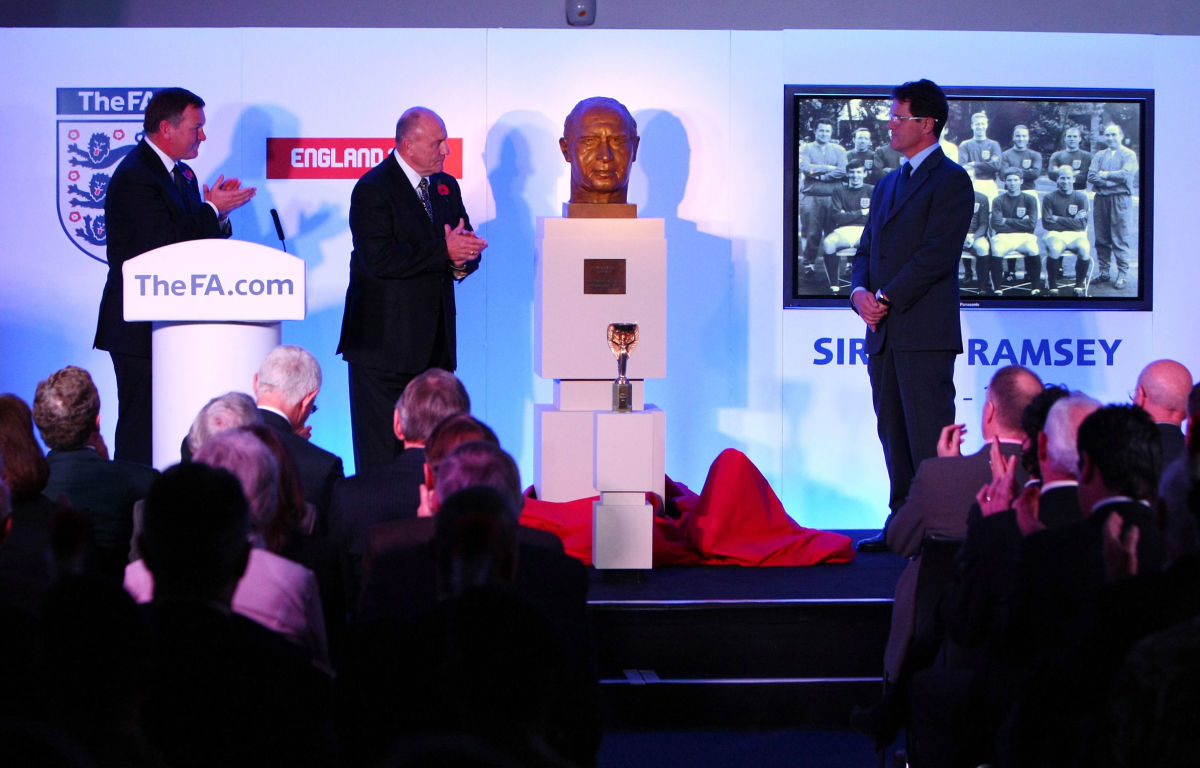World Cup Countdown: 13 Weeks to Go - The Meticulous Sir Alf Ramsey, England's Greatest Manager

Sir Alfred Earnest Ramsey. Alf by name, but unequivocally Earnest by nature. Methodical, meticulous, brazenly professional and above all else English to the core.
Yet, how else would you describe England's only World Cup winning manager? As the inventor of the 'Wingless Wonders'? The inaugural 'dictator' of English football? Or simply its everlasting saviour? All three would be accurate, if not suitably affectionate.
How about as an "enigma", or even a "lone wolf"? He was certainly mysterious, and thought it part of his role as a manager to be so: "I should be difficult difficult to get to know," he is quoted as saying in an ESPN documentary. And for most of his career he was.

But what a career.
An accomplished defender in his playing days, his most successful spell came when he joined a promising Tottenham Hotspur side in 1949. Notorious for their radical 'push and run' style of play, to which Ramsey - with his excellent distribution from the back, and adventurous spirit down the right - quickly became an integral part of, they comfortably won promotion from the second division in his first season.
Becoming known for his tactical acumen, Ramsey earned himself the moniker "the General" from his fellow players, and he was a fulcrum of the side when they were implausibly crowned Champions in their first season in the top flight since 1935.
Astonishingly, Alf would achieve the same feat in even more impressive fashion as a manager just 11 years later, but lets not get ahead of ourselves.
Success with Spurs and with Southampton before that had led to a fruitful international career, and he was regularly picked to play in Walter Winterbottom's side by the FA's selection committee. However, notwithstanding their baseless proclamations of superiority, England never prevailed with Ramsey as a player, and ignominiously crashed out of their first involvement with the World Cup in 1950.
While these failings were almost certainly formative for Ramsey's coaching capabilities, it was perhaps his last outing in an England shirt that had the most profound effect on his managerial style. In what was described as the "Match of the Century", on the 25th of November, 1953 England lost - for the first time on home soil - 6-3 to Hungary, disbanding any lasting theories of supremacy.
Despite the 'Magical Magyars' outperforming their English counterparts on every level, ironically playing a style of football not dissimilar to Spurs' 'push and run', Ramsey was in denial.
With a quip apex Mourinho would be proud of, when asked to assess the result, he replied: "Four of those goals came from outside the penalty area. We should never have lost."
On reflection, this defiantly insolent response to a comprehensive hiding reveals all you need to know about his sensibilities, and why he was always destined for administrative success.

It's hard not to read that quote and deduce this as, if not the birth of his philosophy, then at least a turning point in his career. While the rest of the World fixated on Hungary's enviable talents, Ramsey bemoaned his side's defensive ineptitude and structural weaknesses, something he would not put up with when his time came.
At his retirement, Ramsey was armed with a clear knowledge of the game and a burning desire to harness it, and was promptly offered the role of player-manager by Third Division outfit Ipswich Town.
Insisting his playing days were over, and that total focus on one craft was paramount, he convinced the club to take him on as solely the latter. While it was seen as a bold move by some to thrust such responsibility on such untested shoulders, those who knew him best were unsurprised.
Indeed, England Captain Billy Wright remarked: "In appointing Alf to become their manager Ipswich Town paid a tremendous tribute to intelligent football - and footballers who think!"
#OnThisDay vor genau 5⃣5⃣ Jahren übernahm Sir Alf Ramsey erstmals das Traineramt der englischen Nationalmannschaft 🏴🏆pic.twitter.com/D84Jsq1g3E
— FIFA Fussball-Weltmeisterschaft (@fifaworldcup_de) February 27, 2018
What ensued was nothing short of miraculous. Ramsey slowly began implementing his burgeoning philosophy, to startling effect. Grounded by a strong sense of defensive structure, and the revolutionary condensing of the midfield to remove wingers, he led the Tractor Boys to unprecedented levels of prosperity.
Obtaining promotion in just his second season, for three years he consolidated their position in the Second Division, before attaining First Division status for the first time in their history in his fifth year in charge. In his sixth year, faced with widespread tips for relegation he concluded Ipswich's remarkable transformation by delivering the ultimate prize - an unthinkable League title.
Unfortunately for Ipswich, this triumph rightly propelled Sir Alf into the spotlight, and not long into the following season he was courted by the National Team. On the 1st of May, 1963 he became the first "proper manager of England", assuming unprecedented autonomous control of the Three Lions' ship from the departing Winterbottom.
England : #OnThisDay in 1920, Sir Alf Ramsey – the man who led the #ThreeLions to winning the 1966 #WorldCup – was born. pic.twitter.com/BBpTnMQdXg (via Twitter https://t.co/hit1tCUGj0) pic.twitter.com/Jah36pOHaB
— ⚽️Your Sports News⚽️ (@Yoursportsnews1) January 23, 2018
And the rest, as they say, is history. His metamorphosis from tracksuit to pinstripe, as it's eloquently put in one documentary, was complete. If Ipswich was his ascension as a preeminent mind of the game, England was undoubtedly his coronation... the elocution lessons were presumably included?
A stickler for detail, in his capacity as 'dictator' of English football, Sir Alf effectively brokered the professional era (in a modern sense) in England, and was a torchbearer for many of the game's residing touchstones of minutia and marginal gains.
Trivial acts like warming up on the part of the pitch you were due to play on, or practicing a run up for a corner if there was a running track, which seem obvious now, were cutting edge at the time.
#OnThisDay in 1⃣9⃣2⃣0⃣
— FIFA World Cup (@FIFAWorldCup) January 22, 2018
Sir Alf Ramsey, the mastermind of @England's 1966 #WorldCup win, was born 🏴🏆 pic.twitter.com/Yur3z8zTMq
As Bobby Charlton would later put it: "England were favourites in 1966, and Alf Ramsey's professional attitude was responsible. There's no question of that."
A true pragmatist, he was acutely aware of the relative strengths and weaknesses of his players. Recognising his batch of wide players weren't sufficiently skilful to trouble opponents, he unleashed his previously contrived 4-3-3 system upon the world stage.
One of the first instances of this system in action came in a warm up clash with Spain prior to '66. At the time, Charlton remarked: "The Spanish full backs were just looking at each other while we were going in droves through the middle".
When it came to the tournament itself, the one which he had boldly predicted England would win upon his appointment, the then 46-year-old continued to experiment. In the group stage, he stuck largely to his 4-3-3 system, with the caveat that wingers were in fact deployed.
A shot in time: Lonely end for Sir Alf Ramsey - #Sports
— LatestNewsNetwork (@LNN_Magazine) September 25, 2017
First published on: DailyMail pic.twitter.com/LScvdxefwq
While his scrupulous style was not without drawbacks and casualties - just ask Jimmy Greaves - as long as you replicated his level of thoroughness and effort on the pitch, he would back you till the end.
This was exemplified when Nobbie Stiles came under a fire after their final group game for a brutal tackle. There were calls from FIFA for Ramsey to exclude the midfielder from the quarter final, but he laid down in no uncertain terms that if Stiles were made unavailable, he would resign.
FIFA acquiesced, and England marched on. Awaiting them were a thunderous Argentinian side, and Ramsey astutely dispelled of his formation altogether (as well as his wingers), and instead opted to flood the midfield to make a narrow 4-4-2, with the empowered Stiles a central figure. Of course, it worked.
While he'd showed his resolve in the quarter final, in the proceeding semi final he showed his restraint. With his players enacting his game plan to a tee, having stifled the tournaments deadliest striker in Eusebio and carved out a 1-0 lead, Charlton scored the second in the 80th minute to surely send England on their way to fulfilling his prophecy.
As pandemonium ensued on the bench, with substitutes and coaches equally ecstatic, Ramsey was heard grunting: "I wish you buggers could control yourselves." He knew the job was not done.

And it was this unflappable demeanour that was so crucial in the final. After a German equaliser right at the death had prevented a victory inside 90 minutes, and deflated a nation, he remained level headed.
Keen to stress a psychological advantage over their opponents, and to reassure the expectant crowd, he forced his players to heave themselves up from the floor to stand resolutely to receive his now infamous message.
Unwavering in his trust of his methods and his players, he declared: "You've beaten them once, you might as well do it again." Naturally they did, but those that had prospered most, knew why.
